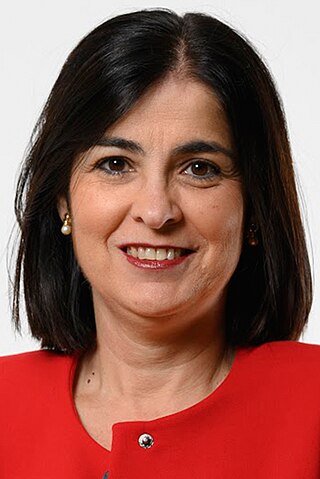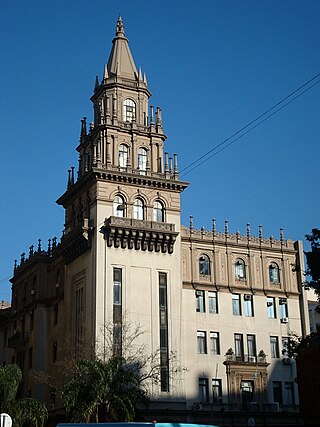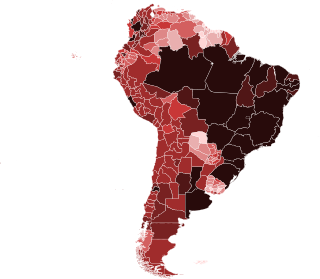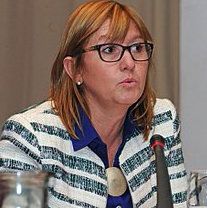
Abortion in Argentina is legal as an elective medical procedure during the first 14 weeks from conception. The abortion law was liberalized after the Voluntary Interruption of Pregnancy Bill was passed by the National Congress in December 2020. According to the law, any woman can request the procedure at any public or private health facility. Doctors are legally bound to either perform it or, if they are conscientious objectors, refer the patient to another physician or health facility. Only three other Latin or South American countries legalised abortion on request nationwide before Argentina did: Cuba in 1965, Guyana in 1995 and Uruguay in 2012. According to polling in 2021, around 44% of Argentines support the legalization of abortion on request; other polls showed 50–60% of Argentines opposed the bill.

Lesbian, gay, bisexual, and transgender (LGBT) rights in Uruguay rank among the highest in the world. Same-sex sexual activity has been legal with an equal age of consent since 1934. Anti-discrimination laws protecting LGBT people have been in place since 2004. Civil unions for same-sex couples have been allowed since 2008 and same-sex marriages since 2013, in accordance with the nation's same-sex marriage law passed in early 2013. Additionally, same-sex couples have been allowed to jointly adopt since 2009 and gays, lesbians and bisexuals are allowed to serve openly in the military. Finally, in 2018, a new law guaranteed the human rights of the trans population.

The Ministry of Public Works Building, now known as the Ministry of Health Building is a public building in the rationalist style located on the intersection of 9 de Julio Avenue and Belgrano Avenue, in the neighborhood of Monserrat, in Buenos Aires, Argentina. It is currently used by the Argentine Ministry of Health.

The Ministry of Health of Argentina is a ministry of the national executive power that oversees, elaborates and coordinates the Argentine national state's public health policy. The ministry is responsible for overseeing Argentina's highly decentralized universal health care system, which according to 2000 figures, serviced over half of the country's population.

Daniel Gollán is an Argentine cardiologist and politician. He served as Health Minister of Argentina for a brief period during the presidency of Cristina Fernández de Kirchner in 2015, and as Health Minister of Buenos Aires Province from 2019 to 2021. Since 2021, he has been a National Deputy.

Carolina Darias San Sebastián is a Spanish civil servant and Spanish Socialist Workers' Party (PSOE) politician who served as minister of Health of Spain from 2021 to 2023. Before that, from 2020 to 2021, she served as Minister of Territorial Policy and Civil Service under Prime Minister Pedro Sánchez.
The COVID-19 pandemic in Ecuador was a part of the worldwide pandemic of coronavirus disease 2019 caused by severe acute respiratory syndrome coronavirus 2. The virus was reported to have spread to Ecuador on 29 February 2020, when a woman in her 70s tested positive for the virus. Ecuador was described in April as emerging as a possible "epicentre" of the pandemic in Latin America, with the city of Guayaquil overwhelmed to the point where bodies were being left in the street.
The COVID-19 pandemic in the Dominican Republic was a part of the worldwide pandemic of coronavirus disease 2019 caused by severe acute respiratory syndrome coronavirus 2. The virus was confirmed to have reached the Dominican Republic on 1 March 2020.

The Ministry of Public Health (MSP) is the ministry of the Government of Uruguay responsible for establishing public health policies and strategies, in order to contribute to the improvement of the health of the inhabitants of the Nation.

Karina Pankievich is a Uruguayan trans rights activist. She is the president of Trans Association of Uruguay.

The COVID-19 pandemic was confirmed to have reached South America on 26 February 2020 when Brazil confirmed a case in São Paulo. By 3 April, all countries and territories in South America had recorded at least one case.

The COVID-19 pandemic in Spain had its first case in the Community of Madrid on 25 February 2020.

María Cristina Lustemberg Haro is a Uruguayan pediatrician and politician of the Broad Front.

Helia Águeda Molina Milman is a Chilean physician, educator, and politician. She served as Minister of Public Health in 2014, during the second government of Michelle Bachelet. She is currently a professor at the University of Santiago's Faculty of Medical Sciences.
Asa Cristina Laurell is a Mexican sociologist who has had a long career in both research and government positions. She grew up in Sweden, but her education eventually brought her to Mexico. In Mexico, she was awarded two degrees and conducted research that focused on health policy, including ensuring access to health care for people in Mexico and various other Latin American countries. She is known for her role in helping to found the Latin American Association of Social Medicine (ALAMES), as well as the contributions she has made to widening access to health care for Mexicans during her time in government. This included serving as Undersecretary of Integration and Development at the Ministry of Health in Mexico.

Carla Vizzotti is an Argentine physician specialized in vaccine-preventable diseases. She was the Secretary of Health Access and Vice Minister of Health in Argentina's Health Ministry, working under Minister Ginés González García, until February 2021. She served as Minister of Health from 2021 to 2023, following González García's resignation.

Julio Daniel Salinas Grecco is a Uruguayan neurologist and politician of Open Cabildo (CA), who served as Minister of Public Health of Uruguay from 1 March 2020 to 13 March 2023.
Ana Lucía de la Garza Barroso was the director of Epidemiological Operations Research at Mexico's Ministry of Health, a doctor in public health who has helped to modernize epidemiological intelligence, and during the COVID-19 pandemic has contributed to the coordination of the International Health component of the COVID-19 response operation in Mexico, providing daily reports on its progress.
Celia Mercedes Alpuche Aranda is a Mexican pediatric infectious disease specialist, researcher and teacher. Since 2013, she has been Deputy Director General of Research Center for Mexico's Infectious Diseases (CISEI) of the National Institute of Public Health.
Juan Abarca Cidón is a Spanish doctor, lawyer, and businessman. He is president of the HM Hospitales Group and of Profesionales de la Medicina y el Derecho (PROMEDE), an expert witness company. He is an advocate of the private health care model, and part of the political debate on public and private healthcare.














